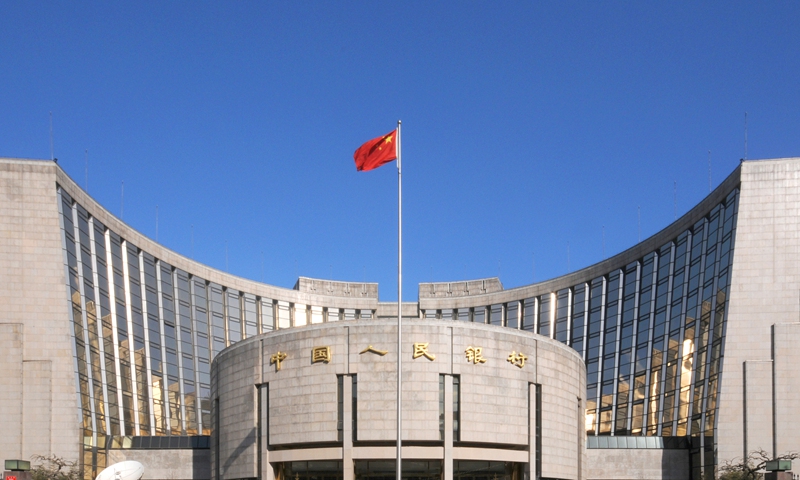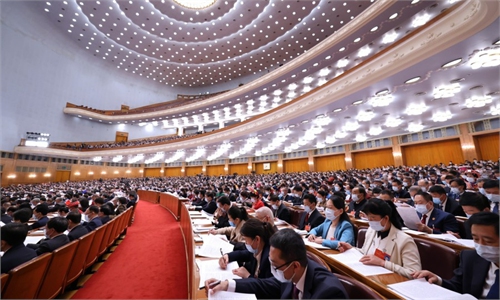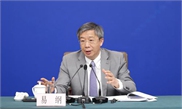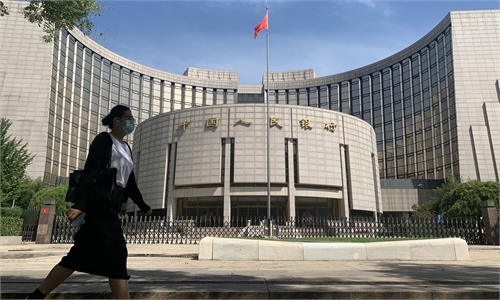China releases plan on reforming Party and state institutions
Central commission for finance to be established ‘to ensure financial stability’

The building of the People's Bank of China in Beijing Photo: VCG
China on Thursday unveiled a finalized plan to set up a central commission for finance, a top-level body aimed at ensuring financial stability under the leadership of the Communist Party of China (CPC) Central Committee, only days after the annual meetings of the country's national legislature and political advisory body concluded.
As part of the plan on reforming Party and state institutions released by the CPC Central Committee and the State Council, the central commission for finance will answer directly to the top Party leadership. Analysts said the release of the plan is "very timely," on top of the recent collapse of the US-based Silicon Valley Bank (SVB), which has triggered concerns over a potential global financial crisis.
Chinese experts also said the reshuffle will further strengthen focuses and deploy strategic moves dedicated to financial security, and especially target the potential financial suppression from some Western economies that could impact the stability of China's financial sector.
A central commission for finance will be established to strengthen the CPC Central Committee's centralized and unified leadership over financial work, according to an institutional reform plan released by the Xinhua News Agency.
It will be responsible for top-level planning, coordination, overall advancement of financial stability and development, and for supervising the work's implementation. The commission will also study and deliberate major policies and matters in the financial sector, among others. An office of the commission will be set up, the plan said.
"It's a revamp of financial and technology systems from an even higher level," Wang Peng, a research fellow at the Beijing Academy of Social Sciences, told the Global Times on Thursday.
According to Wang, the revamp, which comes as external uncertainties are rising globally, is "very timely."
"Whether it is in terms of anti-corruption, improving regulatory efficiency, adapting to the needs of new forms of financial development, or preventing and defusing systemic financial risks, it needs more efficient coordination from the central government," Wang said.
Chinese experts said that maintaining financial stability and defusing risks are of great importance this year. The spillover effects of the US Fed's aggressive rate hikes, represented by the recent failure of SVB, are still affecting other countries, including China, and debt from some developers poses financial risks, especially for small and medium-sized financial institutions.
Global markets remained volatile after the meltdown of SVB and the failure of New York-based Signature Bank over the weekend, although the Joe Biden administration has made efforts to shore up market confidence in the past few days.
Although the shutdown of SVB will unlikely lead to systemic risks, as the management of major financial institutions in the US is relatively stable in terms of liquidity and assets, Chinese experts said the collapse will have a lingering negative impact on the financial system with the spread of market jitters.
The People's Bank of China, or PBC, the country's central bank, on Wednesday vowed to strengthen risk disposal mechanisms, fend off systemic risks, and enhance its sense of crisis and "fighting spirit." It also called for proper responses to containment and suppression by the US and other Western countries.
The PBC said that the overall financial situation in China is stable, and it also vowed to "balance security and development," strengthen mechanisms to prevent and defuse risks, and resolutely safeguard the bottom line against systemic financial risks.
Efforts should be made to strengthen the early detection, correction and handling of financial risks and promote the establishment of working mechanisms to maintain financial stability, the central bank said.
The reform plan released on Thursday also said that a committee will be formed to strengthen the unified leadership over the Party's work in the financial sector.
"The two committees will place financial security first, which is a top priority of national security," Dong Dengxin, director of the Finance and Securities Institute of the Wuhan University of Science and Technology, told the Global Times on Thursday.
According to Dong, the reshuffle will further strengthen the deployment of strategic moves to ensure financial security, as China now faces potential financial suppression from some Western countries, which could hurt the stability of China's financial sector.
Further moves
In addition to the central commission for finance, a central commission for science and technology will also be set up to enhance the CPC Central Committee's centralized and unified leadership over the work of science and technology, the plan said.
Its functions will include pushing forward the building of a national innovation system and structural scientific and technological reform, studying and deliberating major strategies, plans and policies for the country's sci-tech development, and coordinating efforts to resolve major issues of strategic, guiding and fundamental significance in the sci-tech sector.
Whether it's in the field of finance or science and technology, the new organs - which are top-level coordination mechanisms - will no doubt help the nation better implement major development policies, Wang said.
A Hong Kong and Macao work office of the CPC Central Committee will be formed on the basis of the existing Hong Kong and Macao Affairs Office of the State Council, according to the plan. The new office will function as a working body of the CPC Central Committee. The name of the Hong Kong and Macao Affairs Office of the State Council will be retained, said the plan.
The Hong Kong and Macao Affairs Office of the State Council on Thursday expressed its full support for the implementation of the reform, saying such arrangements reflect the central government's great attention and firm determination to carry on and improve the policy system of One Country, Two Systems.
A social work department of the CPC Central Committee will be formed, the plan said. It will coordinate and guide the work in handling public complaints and soliciting people's opinions.
The department will also be responsible for Party building work in mixed-ownership and non-public enterprises, and new types of economic and social organizations and among groups in new forms of employment, according to the plan.
The department will oversee the National Public Complaints and Proposals Administration.
Since the 18th CPC National Congress held in 2012, efforts have been made to further reform Party and state institutions, leading to systemic and holistic transformations of their functions, the plan said, according to the Xinhua News Agency.
However, the institutional setup and the allocation of functions of Party and state institutions have not yet been fully adapted to new tasks, the plan noted, adding that further reforms and adjustments are needed.
It stated that the aim of reforming Party and state institutions is building a functional system of Party and state institutions that is well developed, procedure-based and efficient.
Efforts are needed to deepen institutional reform in key areas and ensure that the Party's leadership over socialist modernization becomes more refined in institutional setup, more optimized in the division of functions, more improved in institutions and mechanisms, and more efficient in operation and management, according to the plan.



